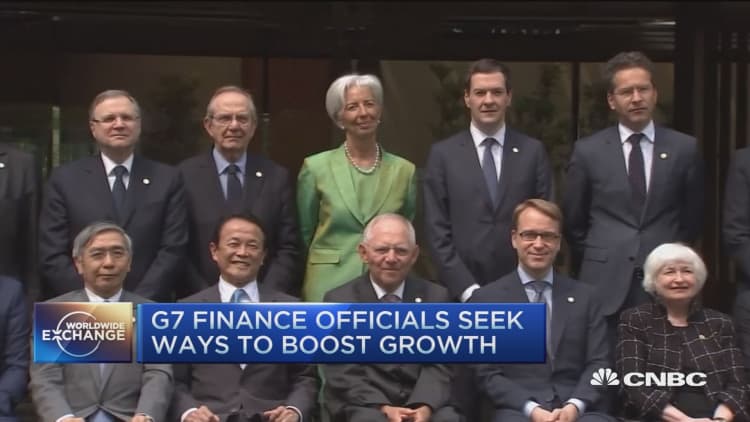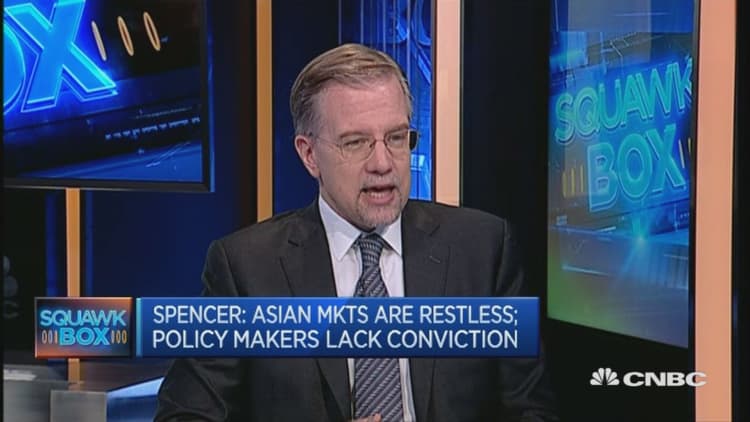
The U.S. issued a fresh warning to Japan against competitive currency devaluation on Saturday, exposing a rift on exchange-rate policy that overshadowed a Group of 7 (G-7) finance leaders gathering hosted by the Asian nation.
Japan and the U.S. have been at logger-heads over currency policy, with Washington saying Tokyo had no justification to intervene in the market to stem yen gains, given the currency's moves remained "orderly".
In bilateral talks ahead of the second day of G-7 talks in Sendai, Japan, on Saturday, U.S. Treasury Secretary Jack Lew told Japanese Finance Minister Taro Aso that it was important to refrain from competitive currency devaluations.
"Secretary Lew underscored that the commitments made by the G-20 in Shanghai to use all policy tools to promote growth - fiscal policy, monetary policy and structural reforms - and to refrain from competitive devaluation and communicate closely have helped to contribute to confidence in the global economy in recent months," according to a statement by the Treasury Department.
"He noted the importance of countries continuing to adhere to those commitments," the statement said.
In another statement, released after the meeting closed, Lew underlined again the importance of the agreement, struck when the G-20 met in Shanghai, China, in February, on avoiding competitive currency devaluations.
"Over the past few days, I have emphasized the importance of reaffirming our exchange rate commitments, including our agreement to consult closely with one another and to refrain from competitive devaluation," Lew said.
"Those commitments made in Shanghai, along with our agreement to use all policy levers to boost global growth, have helped to contribute to more confidence in the global economy and I certainly hope that the meetings we have had here in Sendai among the G-7 will have that same effect."
Japan maintains that yen's moves are disorderly
In its own statement released after the G-7 meeting ended on Saturday afternoon, Japan said that the group had reaffirmed its existing exchange rate policies, including not targeting FX rates, and agreed that excess volatility and disorderly currency moves could hurt the global economy.
The G-7 finance leaders "underscored the importance of all countries refraining from competitive devaluation," according to the Japanese summary. The summary included a note saying it "does not officially represent the G-7 consensus."
After the meeting, however, Japanese Finance Minister Taro Aso said he had told Lew that there had been "rapid, one-sided" moves in the yen's value. Aso also noted this his exchange with Lew had not been heated.
"I understand to a certain degree that [the yen] may move up or down. However, looking at the past several weeks, the yen has moved by 5 yen in two days or 8-9 yen in 10 days and we cannot clearly say such a move is orderly," he said.
"From the U.S. standpoint, they may say the yen was at 70 yen or so until recently. That was natural for them. They are facing elections, we are facing elections too, and both have [Trans Pacific Partnership, reference to the recent trade deal that is awaiting approval by U.S. Congress]. It is our job to make statements. We must prevent such differences of opinions from becoming emotionally complicated by exchanging opinions."
The yen has strengthened considerably against the dollar since the Bank of Japan introduced a negative interest rate policy on January 29, although the greenback gained back some ground this week on heightened expectations the Federal Reserve could raise interest rates at its June meeting.
A stronger yen hurts Japan's economy by making its exported goods more expensive.
Japanese policymakers have repeatedly said that intervening to weaken the currency would not necessarily violate the "no competitive devaluation" agreement because the yen's move higher was not due to normal currency market moves.
At the same time, French finance minister Michel Sapin said that the G7 did not specifically discuss Japan's currency policies, but that he saw no need for any country to intervene in the FX market at present.
G7 splintering on response to global slowdown

As years of aggressive money printing stretch the limits of monetary policy, the G7 policy response to anemic inflation and subdued growth has become increasingly splintered.
Germany has shown no signs of responding to calls from Japan and the United States to boost fiscal spending. Washington also warned Tokyo against relying too much on monetary policy with a senior U.S. Treasury official saying structural reforms are being put in place in Japan "but slowly."
The official also said Japan should ensure its fiscal policy does not hurt its economy, calling for either a delay in next year's scheduled sales tax hike or fiscal stimulus to compensate for the drag on the economy.
With the once close-knit group divided on how much each country should boost fiscal spending, the G7 finance leaders will call for a mix of monetary, fiscal and structural policies to boost demand - but leave it to each country to decide its own policy priorities.
"I'm aware that there are countries that can deploy fiscal stimulus, while others cannot due to their own situations," Aso said on Friday, suggesting that Tokyo was backing down from its earlier calls for joint G7 fiscal action.
While headwinds like weak emerging market demand persists, the G7 finance leaders appeared to have a slightly more optimistic view of the global economy as calm returns to financial markets.
"We agreed that the world economic environment is better than some feared a few months ago," German Finance Minister Wolfgang Schaeuble told reporters after the first round of talks on Friday.
- CNBC contributed to this report.



